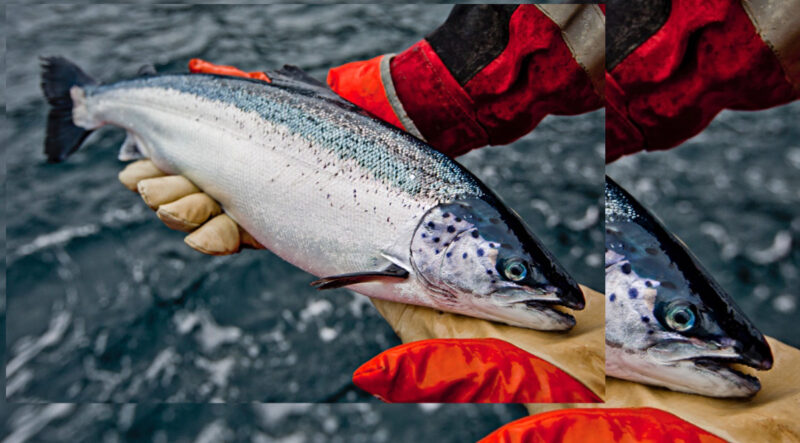Activists correct their fishy science about salmon virus
Correction follows a series of alarmist claims by activists, who have been trotting out fishy science, to attack BC salmon farmers.
By Fabian Dawson
SeaWestNews
A group of anti-salmon farm activists in BC have quietly corrected their study which suggested wild stocks exposed to marine aquaculture sites have much higher rates of viral infection.
The correction to their original 2017 study, which was posted last month in the journal PLOS ONE, dismantles claims by the activists that the abundance of the piscine orthoreovirus (PRV) in wild fish is related to exposure to salmon farms.
The correction and new data “does not support the conclusion of the original analysis that the proportion of PRV infection in wild fish was related to exposure to salmon farms”, said Dr. Gary Marty, a veteran fish pathologist with the Animal Health Centre of BC’s Ministry of Agriculture, Food, and Fisheries.
The data also do not support the conclusion that PRV poses a risk of reduced fitness in Fraser River wild salmon by impacting their survival and reproduction, Dr. Marty told SeaWestNews.
Dr. Marty has posted several questions about the correction in PLOS ONE to seek more information from the authors.
“In summary, until these many questions are answered, we cannot have any confidence in the conclusions of the original paper,” he said.
PRV has long been present in wild salmon in Pacific Northwest waters and all experimental exposures of the BC strain of PRV to Pacific and Atlantic salmon in BC have failed to induce disease or mortality, according to consensus by a broad range of fisheries scientists.
In other words, PRV is endemic to B.C., so it’s very likely you will find it whether you are sampling waters off Kitsilano beaches or Tofino or anywhere else in B.C., close to or far away from fish farms.
But the activists, including the authors of the original and corrected study – Alexandra Morton, Richard Routledge, Stacey Hrushowy, Molly Kibenge and Frederick Kibenge – insist their alarmist findings are accurate.
“These minor corrections had no impact on the results of the statistical analyses reported in the paper or the subsequent discussion or conclusions,” they said in posting the correction.
Morton and her crew, whose objective is to shut down ocean-based fish farming in BC, used farmed salmon bought from supermarkets and irregular sampling of wild salmon to come up with their original document.
They then published their conclusions without authoritative reviews claiming strong conclusions regarding the transfer of the piscine orthoreovirus (PRV) from farm-raised salmon to wild salmon.
An independent analysis of their posted correction shows the original paper didn’t report Ct values, just that PRV had been detected. Ct or ‘Cycle threshold’ values are used to indicate the general amount of virus detected.
The corrected paper does report Ct values. And those indicated that in 111 of the 116 PRV positive results, the Ct values for PRV were in the range of being suspect cases, and not true positives.
Of the five remaining samples with greater levels of PRV, two fish had been exposed to salmon farms and the other three had not been.
“Therefore, the data do not support the analysis that the proportion of PRV infection in wild fish was related to exposure to salmon farms,” said the analyst.
The same group published a paper in 2011 titled “Lethal Atlantic virus found in Pacific salmon”. That paper was also proven to be false leading to the laboratory that did the screening work to lose its international accreditation. The lab is the same one that did the work on the current study and its correction.
The Minister of Fisheries and Oceans then stated, “because some have chosen to draw conclusions based on unconfirmed information, this has resulted in British Columbia’s fishing industry and Canada’s reputation being put at risk needlessly.”
The activist-scientists were also warned by the BC Government and Fisheries and Oceans Canada that reckless allegations based on incomplete science can be devastating and unfair to the families that make a living from the sea.
Dr. Ian Gardner, Canada Excellence Research Chair in Aquatic Epidemiology, who is part of the Strategic Salmon Health Initiative (SSHI) has described the PRV studies by the activists as making “broad sweeping statements not supported by evidence.”
Dr. Kenneth Warheit, fish health and genetic specialist for the Washington Department of Fish and Wildlife has said activists have failed to find a single study to support the claim that PRV from open-water pens will harm wild fish.
Kyle Garver a research scientist for Fisheries and Oceans Canada and a PRV expert has also concluded that PRV has been ubiquitous in the Pacific Northwest for many decades, and that it isn’t linked to any fish disease or mortality.
The virus does not kill sockeye salmon or Atlantic salmon, the Canadian Science Advisory Secretariat (CSAS), which reviewed Canadian and international PRV data, concluded.
Two other studies found that the strain of PRV found in B.C. fish to be benign. The first, published in Scientific Reports, was conducted by scientists from the Pacific Biological Station and the provincial government’s Animal Health Centre. The other, published in Frontiers in Physiology, was conducted by scientists at the University of BC and the Pacific Biological Station.
But these activists continue to trot out their fishy science as part of their deliberate campaign to attack BC salmon farmers, said an industry official.
“It clouds the important work being done by highly educated and trained scientists here and in other parts of the world,” he said.
“The original paper was widely covered by the media following a publicity blitz by the anti-salmon farming activists…the correction however, has not merited a press release,” he pointed out.
(Image courtesy Cermaq Canada)

